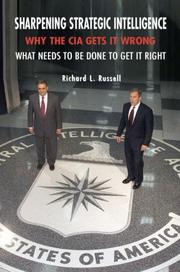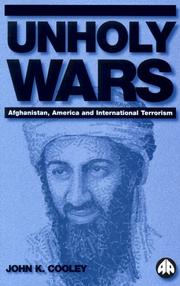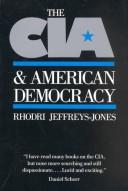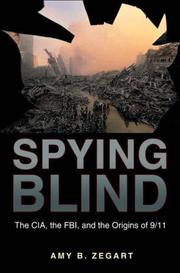| Listing 1 - 10 of 15 | << page >> |
Sort by
|
Book
ISBN: 0688093868 Year: 1992 Publisher: Morrow
Abstract | Keywords | Export | Availability | Bookmark
 Loading...
Loading...Choose an application
- Reference Manager
- EndNote
- RefWorks (Direct export to RefWorks)
Intelligence service --- United States. --- Agjencia Qendrore e Inteligjencës --- Central Intelligence Agency (U.S.) --- CIA (Central Intelligence Agency (U.S.)) --- CIP (United States. Centrālās izlūkošanas pārvalde) --- Mei-kuo chung yang chʻing pao chü --- National Security Council (U.S.). --- Si Aing Ei --- T︠S︡entralʹnoe razvedyvatelʹnoe upravlenie SShA --- T︠S︡RU SShA --- T︠S︡RU (T︠S︡entralʹnoe razvedyvatelʹnoe upravlenie SShA) --- ЦРУ США --- ЦРУ (Центральное разведывательное управление США) --- Центральное разведывательное управление США --- ארצות הברית. --- 美國. --- National Security Council (U.S.) --- CIA (Central Intelligence Agency)

ISBN: 9780511509902 9780521878159 9780521702379 0511289553 9780511289552 9780511290152 0511290152 0511509901 0521878152 0521702372 1107172500 1280916966 9786610916962 0511321708 0511288239 0511288913 Year: 2007 Publisher: Cambridge New York Cambridge University Press
Abstract | Keywords | Export | Availability | Bookmark
 Loading...
Loading...Choose an application
- Reference Manager
- EndNote
- RefWorks (Direct export to RefWorks)
This book critically examines the weaknesses of American intelligence led by the Central Intelligence Agency in informing presidential decision making on issues of war and peace. It evaluates the CIA's strategic intelligence performance during the Cold War and post-Cold War periods as a foundation for examining the root causes of intelligence failures surrounding the September 11th attacks and assessments of Iraq's weapons of mass destruction programs in the run up to the Iraq War. The book probes these intelligence failures, which lie in the CIA's poor human intelligence collection and analysis practices. The book argues that none of the post-9/11 intelligence reforms have squarely addressed these root causes of strategic intelligence failure and it recommends measures for redressing these dangerous vulnerabilities in American security.
Intelligence service --- Terrorism --- Government policy --- United States. --- Agjencia Qendrore e Inteligjencës --- Central Intelligence Agency (U.S.) --- CIA (Central Intelligence Agency) --- CIP (United States. Centrālās izlūkošanas pārvalde) --- Mei-kuo chung yang chʻing pao chü --- National Security Council (U.S.). --- Si Aing Ei --- T︠S︡entralʹnoe razvedyvatelʹnoe upravlenie SShA --- T︠S︡RU SShA --- T︠S︡RU (T︠S︡entralʹnoe razvedyvatelʹnoe upravlenie SShA) --- ЦРУ США --- ЦРУ (Центральное разведывательное управление США) --- Центральное разведывательное управление США --- ארצות הברית. --- 美國. --- National Security Council (U.S.) --- Social Sciences --- Political Science
Book
ISBN: 1316952541 1316953432 1316954323 1316957888 1316941310 1316955214 1107187400 1316638065 1316947203 Year: 2017 Publisher: Cambridge : Cambridge University Press,
Abstract | Keywords | Export | Availability | Bookmark
 Loading...
Loading...Choose an application
- Reference Manager
- EndNote
- RefWorks (Direct export to RefWorks)
Examining the political foundations of American intelligence policy, this book develops a new theory of intelligence adaptation to explain the success or failure of major reform efforts since World War II. Durbin draws on careful case histories of the early Cold War, the Nixon and Ford administrations, the first decade after the Cold War, and the post-9/11 period, looking closely at the interactions among Congress, executive branch leaders, and intelligence officials. These cases demonstrate the significance of two factors in the success or failure of reform efforts: the level of foreign policy consensus in the system, and the ability of reformers to overcome the information advantages held by intelligence agencies. As these factors ebb and flow, windows of opportunity for reform open and close, and different actors and interests come to influence reform outcomes. Durbin concludes that the politics of US intelligence frequently inhibit effective adaptation, undermining America's security and the civil liberties of its citizens.
Intelligence service --- Counter intelligence --- Counterespionage --- Counterintelligence --- Intelligence community --- Secret police (Intelligence service) --- Public administration --- Research --- Disinformation --- Secret service --- Political aspects --- United States. --- Agjencia Qendrore e Inteligjencës --- Central Intelligence Agency (U.S.) --- CIA (Central Intelligence Agency) --- CIP (United States. Centrālās izlūkošanas pārvalde) --- Mei-kuo chung yang chʻing pao chü --- National Security Council (U.S.). --- Si Aing Ei --- T︠S︡entralʹnoe razvedyvatelʹnoe upravlenie SShA --- T︠S︡RU SShA --- T︠S︡RU (T︠S︡entralʹnoe razvedyvatelʹnoe upravlenie SShA) --- ЦРУ США --- ЦРУ (Центральное разведывательное управление США) --- Центральное разведывательное управление США --- ארצות הברית. --- 美國. --- National Security Council (U.S.) --- History. --- Management. --- Reorganization.
Book
ISBN: 147442886X 1474485049 1474428843 Year: 2020 Publisher: Edinburgh : Edinburgh University Press,
Abstract | Keywords | Export | Availability | Bookmark
 Loading...
Loading...Choose an application
- Reference Manager
- EndNote
- RefWorks (Direct export to RefWorks)
Written by intelligence scholars and experts, this book chronicles the evolution of the CIA: its remarkable successes, its controversial failures and its clandestine operations. The history of the agency is presented through the prism of its declassified documents, with each being supplemented by insightful contextual analysis.
Espionage, American --- National security --- National security policy --- NSP (National security policy) --- Security policy, National --- Economic policy --- International relations --- Military policy --- American espionage --- History. --- Government policy --- United States. --- Agjencia Qendrore e Inteligjencës --- Central Intelligence Agency (U.S.) --- CIA (Central Intelligence Agency) --- CIP (United States. Centrālās izlūkošanas pārvalde) --- Mei-kuo chung yang chʻing pao chü --- National Security Council (U.S.). --- Si Aing Ei --- T︠S︡entralʹnoe razvedyvatelʹnoe upravlenie SShA --- T︠S︡RU SShA --- T︠S︡RU (T︠S︡entralʹnoe razvedyvatelʹnoe upravlenie SShA) --- ЦРУ США --- ЦРУ (Центральное разведывательное управление США) --- Центральное разведывательное управление США --- ארצות הברית. --- 美國. --- National Security Council (U.S.)
Book
ISBN: 1108663222 1316997707 1108725546 Year: 2020 Publisher: Cambridge : Cambridge University Press,
Abstract | Keywords | Export | Availability | Bookmark
 Loading...
Loading...Choose an application
- Reference Manager
- EndNote
- RefWorks (Direct export to RefWorks)
During the period of decolonisation in Africa, the CIA subsidised a number of African authors, editors and publishers as part of its anti-communist covert propaganda strategy. Managed by two front organisations, the Congress of Cultural Freedom and the Farfield Foundation, its Africa programme stretched across the continent, with hubs in Ibadan, Kampala, Nairobi, Cape Town and Johannesburg. This Element unravels the hidden networks and associations underpinning African literary publishing in the 1960s; it investigates the success of the CIA in disrupting and infiltrating African literary magazines and publishing firms, and determines the extent to which new circuits of cultural and literary power emerged. Based on new archival evidence relating to the Transcription Centre, The Classic and The New African, it includes case studies of Wole Soyinka, Nat Nakasa and Bessie Head, which assess how their literary careers were influenced by these transnational literary institutions, and their response to these interventions.
Publishers and publishing --- African literature --- Communism in literature. --- Black literature (African) --- Authors, African --- Book publishing --- Books --- Book industries and trade --- Booksellers and bookselling --- Political aspects --- History --- Publishing --- United States. --- Agjencia Qendrore e Inteligjencës --- Central Intelligence Agency (U.S.) --- CIA (Central Intelligence Agency) --- CIP (United States. Centrālās izlūkošanas pārvalde) --- Mei-kuo chung yang chʻing pao chü --- National Security Council (U.S.). --- Si Aing Ei --- T︠S︡entralʹnoe razvedyvatelʹnoe upravlenie SShA --- T︠S︡RU SShA --- T︠S︡RU (T︠S︡entralʹnoe razvedyvatelʹnoe upravlenie SShA) --- ЦРУ США --- ЦРУ (Центральное разведывательное управление США) --- Центральное разведывательное управление США --- ארצות הברית. --- 美國. --- National Security Council (U.S.)

ISBN: 0745313280 Year: 1999 Publisher: London Pluto
Abstract | Keywords | Export | Availability | Bookmark
 Loading...
Loading...Choose an application
- Reference Manager
- EndNote
- RefWorks (Direct export to RefWorks)
Acts of terrorism --- Terrorism --- Terrorisme --- Terrorist acts --- Espionage, American --- Terrorism. --- Attacks, Terrorist --- Global terrorism --- International terrorism --- Political terrorism --- Terror attacks --- Terrorist attacks --- World terrorism --- Direct action --- Insurgency --- Political crimes and offenses --- Subversive activities --- Political violence --- Terror --- American espionage --- United States. --- Agjencia Qendrore e Inteligjencës --- Central Intelligence Agency (U.S.) --- CIA (Central Intelligence Agency (U.S.)) --- CIP (United States. Centrālās izlūkošanas pārvalde) --- Mei-kuo chung yang chʻing pao chü --- National Security Council (U.S.). --- Si Aing Ei --- T︠S︡entralʹnoe razvedyvatelʹnoe upravlenie SShA --- T︠S︡RU SShA --- T︠S︡RU (T︠S︡entralʹnoe razvedyvatelʹnoe upravlenie SShA) --- ЦРУ США --- ЦРУ (Центральное разведывательное управление США) --- Центральное разведывательное управление США --- ארצות הברית. --- 美國. --- National Security Council (U.S.) --- Afghanistan --- United States --- Foreign relations --- Espionage [American ] --- Islamic countries --- United States. Central Intelligence Agency --- United States. - Central Intelligence Agency. --- Espionage, American - Islamic countries. --- Afghanistan - Foreign relations - United States. --- CIA (Central Intelligence Agency)
Book
ISBN: 9780822374381 0822374382 082236106X 0822361256 Year: 2016 Publisher: Durham : Duke University Press,
Abstract | Keywords | Export | Availability | Bookmark
 Loading...
Loading...Choose an application
- Reference Manager
- EndNote
- RefWorks (Direct export to RefWorks)
David H. Price uses information from CIA, FBI, and military records to map the connections between academia and the strategic use of anthropological research to further the goals of the U.S. military and outline the major influence the American security state has had on the field of anthropology.
Anthropology --- Anthropologists --- Military intelligence --- Science and state --- Cold War. --- Political aspects --- History --- Political activity --- United States. --- United States --- Science --- Science policy --- State and science --- State, The --- World politics --- Scientists --- Primitive societies --- Human beings --- Government policy --- Agjencia Qendrore e Inteligjencës --- Central Intelligence Agency (U.S.) --- CIA (Central Intelligence Agency) --- CIP (United States. Centrālās izlūkošanas pārvalde) --- Mei-kuo chung yang chʻing pao chü --- National Security Council (U.S.). --- Si Aing Ei --- T︠S︡entralʹnoe razvedyvatelʹnoe upravlenie SShA --- T︠S︡RU SShA --- T︠S︡RU (T︠S︡entralʹnoe razvedyvatelʹnoe upravlenie SShA) --- ЦРУ США --- ЦРУ (Центральное разведывательное управление США) --- Центральное разведывательное управление США --- ארצות הברית. --- 美國. --- National Security Council (U.S.) --- 20th century --- political activity --- history --- cold war --- science and state --- anthropologists --- political aspects --- military intelligence --- united states --- anthropology --- Social sciences

ISBN: 0300050178 0300208502 0300041497 9780300208504 0300099487 9780300099485 0300077378 9780300077377 Year: 1989 Publisher: New Haven, Conn. Yale University Press
Abstract | Keywords | Export | Availability | Bookmark
 Loading...
Loading...Choose an application
- Reference Manager
- EndNote
- RefWorks (Direct export to RefWorks)
This third edition of Rhodri Jeffreys-Jones's engrossing history of the Central Intelligence Agency includes a new prologue that discusses the history of the CIA since the end of the Cold War, focusing in particular on the intelligence dimensions of the terrorist attacks on 9/11.Praise for the earlier editions:"I have read many books on the CIA, but none more searching and still dispassionate. Nor would I have believed that a book of such towering scholarship could still be so lucid and exciting to read."-Daniel Schorr"This is one of the best short histories of the CIA in print, up-to-date and based on a wide range of sources."-Walter Laqueur"Judicious and reasonable. . . . A sophisticated study that should challenge us to take a more serious view about how our democracy formulates its foreign policy."-David P. Calleo, New York Times Book ReviewA brief, yet subtle and penetrating, account of the Central Intelligence Agency."-Leonard Bushkoff, Christian Science Monitor"Subtle and crisply written. . . . A book remarkable for its clarity and lack of bias."-William W. Powers, Jr., International Herald Tribune, Paris
United States. --- History. --- Agjencia Qendrore e Inteligjencës --- Central Intelligence Agency (U.S.) --- CIA (Central Intelligence Agency (U.S.)) --- CIP (United States. Centrālās izlūkošanas pārvalde) --- Mei-kuo chung yang chʻing pao chü --- National Security Council (U.S.). --- Si Aing Ei --- T︠S︡entralʹnoe razvedyvatelʹnoe upravlenie SShA --- T︠S︡RU SShA --- T︠S︡RU (T︠S︡entralʹnoe razvedyvatelʹnoe upravlenie SShA) --- ЦРУ США --- ЦРУ (Центральное разведывательное управление США) --- Центральное разведывательное управление США --- ארצות הברית. --- 美國. --- 351.746 <73> --- Politieke politie. Staatspolitie. Grenspolitie. Vreemdelingenpolitie. Geheimepolitie. Prive politie. Detectives. Lijfwachten. Zedenpolitie. Anti-drugbrigade. prive militie--Verenigde Staten van Amerika. VSA. USA --- United States. Central Intelligence Agency --- 351.746 <73> Politieke politie. Staatspolitie. Grenspolitie. Vreemdelingenpolitie. Geheimepolitie. Prive politie. Detectives. Lijfwachten. Zedenpolitie. Anti-drugbrigade. prive militie--Verenigde Staten van Amerika. VSA. USA --- National Security Council (U.S.) --- International relations. Foreign policy --- United States --- Secret service --- Service secret --- CIA (Central Intelligence Agency) --- POLITICAL SCIENCE / Intelligence & Espionage. --- United States. -- Central Intelligence Agency -- History. --- Democracy. --- Self-government --- Political science --- Equality --- Representative government and representation --- Republics --- United States of America

ISBN: 9780691120218 0691120218 0691141037 9786612158056 1282158058 1400830273 9781400830275 9780691141039 9780691141039 Year: 2009 Publisher: Princeton, NJ
Abstract | Keywords | Export | Availability | Bookmark
 Loading...
Loading...Choose an application
- Reference Manager
- EndNote
- RefWorks (Direct export to RefWorks)
In this pathbreaking book, Amy Zegart provides the first scholarly examination of the intelligence failures that preceded September 11. Until now, those failures have been attributed largely to individual mistakes. But Zegart shows how and why the intelligence system itself left us vulnerable. Zegart argues that after the Cold War ended, the CIA and FBI failed to adapt to the rise of terrorism. She makes the case by conducting painstaking analysis of more than three hundred intelligence reform recommendations and tracing the history of CIA and FBI counterterrorism efforts from 1991 to 2001, drawing extensively from declassified government documents and interviews with more than seventy high-ranking government officials. She finds that political leaders were well aware of the emerging terrorist danger and the urgent need for intelligence reform, but failed to achieve the changes they sought. The same forces that have stymied intelligence reform for decades are to blame: resistance inside U.S. intelligence agencies, the rational interests of politicians and career bureaucrats, and core aspects of our democracy such as the fragmented structure of the federal government. Ultimately failures of adaptation led to failures of performance. Zegart reveals how longstanding organizational weaknesses left unaddressed during the 1990's prevented the CIA and FBI from capitalizing on twenty-three opportunities to disrupt the September 11 plot. Spying Blind is a sobering account of why two of America's most important intelligence agencies failed to adjust to new threats after the Cold War, and why they are unlikely to adapt in the future.
Intelligence service --- September 11 Terrorist Attacks, 2001. --- Terrorism --- Government policy --- United States. --- TerrorismGovernment policyUnited States. --- 9/11 Terrorist Attacks, 2001 --- 911 Terrorist Attacks, 2001 --- Attack on America, 2001 (September 11 Terrorist Attacks) --- Nine-Eleven Terrorist Attacks, 2001 --- Pentagon-World Trade Center Terrorist Attacks, 2001 --- Sept. 11 Terrorist Attacks, 2001 --- September 11 Terror Attacks, 2001 --- September 11 Terrorism, 2001 --- Terrorist Attacks, September 11, 2001 --- World Trade Center-Pentagon Terrorist Attacks, 2001 --- FBI --- FBR --- Federal Bureau of Investigation (U.S.) --- Federalʹnoe bi︠u︡ro rassledovaniĭ v SShA --- Agjencia Qendrore e Inteligjencës --- Central Intelligence Agency (U.S.) --- CIA (Central Intelligence Agency (U.S.)) --- CIP (United States. Centrālās izlūkošanas pārvalde) --- Mei-kuo chung yang chʻing pao chü --- National Security Council (U.S.). --- Si Aing Ei --- T︠S︡entralʹnoe razvedyvatelʹnoe upravlenie SShA --- T︠S︡RU SShA --- T︠S︡RU (T︠S︡entralʹnoe razvedyvatelʹnoe upravlenie SShA) --- ЦРУ США --- ЦРУ (Центральное разведывательное управление США) --- Центральное разведывательное управление США --- ארצות הברית. --- 美國. --- Hijacking of aircraft --- National Security Council (U.S.) --- CIA (Central Intelligence Agency) --- BPB2211 --- Comité permanent de Contrôle des services de renseignement et de sécurité (Comité permanent R) --- Vast Comité van Toezicht op de inlichtingen- en veiligheidsdiensten (Vast Comité I)
Book
ISBN: 9780292772465 0292772467 Year: 2016 Publisher: Austin University of Texas Press
Abstract | Keywords | Export | Availability | Bookmark
 Loading...
Loading...Choose an application
- Reference Manager
- EndNote
- RefWorks (Direct export to RefWorks)
Spy films --- Espionage in motion pictures. --- Motion pictures --- Motion picture industry --- Spy television programs --- #SBIB:309H1314 --- #SBIB:309H1320 --- Espionage television programs --- Cloak and dagger films --- Espionage films --- Secret agent films --- Secret service films --- History and criticism. --- Political aspects --- Filmwezen: politieke, juridische, ethische, ideologische aspecten. --- De filmische boodschap: algemene werken (met inbegrip van algemeen filmhistorische werken en filmhistorische werken per land) --- United States. --- Agjencia Qendrore e Inteligjencës --- Central Intelligence Agency (U.S.) --- CIA (Central Intelligence Agency (U.S.)) --- CIP (United States. Centrālās izlūkošanas pārvalde) --- Mei-kuo chung yang chʻing pao chü --- National Security Council (U.S.). --- Si Aing Ei --- T︠S︡entralʹnoe razvedyvatelʹnoe upravlenie SShA --- T︠S︡RU SShA --- T︠S︡RU (T︠S︡entralʹnoe razvedyvatelʹnoe upravlenie SShA) --- ЦРУ США --- ЦРУ (Центральное разведывательное управление США) --- Центральное разведывательное управление США --- ארצות הברית. --- 美國. --- In motion pictures. --- Influence. --- Television programs --- National Security Council (U.S.) --- CIA (Central Intelligence Agency) --- History and criticism --- Espionage in motion pictures --- Filmwezen: politieke, juridische, ethische, ideologische aspecten
| Listing 1 - 10 of 15 | << page >> |
Sort by
|

 Search
Search Feedback
Feedback About UniCat
About UniCat  Help
Help News
News